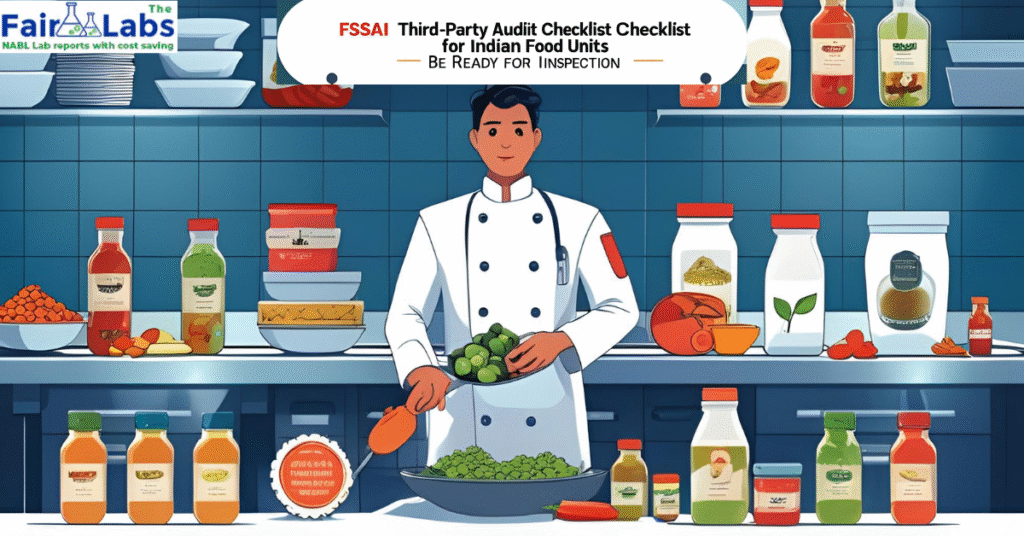The FSSAI Third-Party Audit Checklist is a comprehensive tool designed to evaluate the compliance of food business operators with food safety and hygiene regulations set by the Food Safety and Standards Authority of India (FSSAI). This is basically an inspection or audit conducted through third-party private agencies and organizations that ensure adherence to FSSAI standards, protecting consumer health and guaranteeing food product quality. As a food operator or provider in India, it’s essential to be familiar with the FSSAI rules and regulations governing food units. With the government’s increased focus on ensuring compliance, especially in the age of social media, failure to meet FSSAI standards can result in penalties. Let’s see what is the FSSAI third-party audit checklist for Indian food units in detail.
FSSAI audit checklist
There is a structured document available on the FSSAI website that outlines the Indian food standards that food operators must adhere to in the market. FSSAI conducts inspection audits to assess whether food manufacturers and providers are adhering to food safety standards and regulations. These audits help strengthen the overall system by evaluating various aspects, including:
Documentation: Checking records and documents related to food safety practices.
Processes: Evaluating manufacturing processes, handling, and storage practices.
Facilities: Assessing the condition and cleanliness of facilities.
Training: Reviewing employee training programs on food safety.
Compliance: Verifying adherence to FSSAI regulations and standards.
By conducting these audits, FSSAI aims to ensure that food businesses operate in a safe and controlled environment, ultimately protecting consumer health.
Food safety auditing regulations
FSSAI’s Food Safety Auditing Regulations, 2018, outline procedures for auditing agencies and auditors. The regulations cover all the aspects of audit frequency, scope, and auditor duties. Food safety auditing regulation assesses compliance with FSSAI standards, promoting self-regulation and reducing inspection frequency for compliant businesses, ultimately ensuring consumer safety and trust in the Indian food industry and Indian Food Units.
FSSAI Compliance Audit
FSSAI Compliance audit identifies areas for improvement, ensures consumer safety, and helps businesses avoid penalties and reputational damage by maintaining high food safety standards. FSSAI Compliance Audit includes:
Food safety and hygiene practices
The FSSAI guidelines outline general hygienic and sanitary practices for food business operators. The guidelines are divided into five parts, covering different types of food businesses:
Part 1: Registration Of The food operators and street food vendors
Part 2: FSSAI approved Legal Licence for Manufacturing, processing, packaging, storage, and distribution
Part 3: FSSAI approved a legal license for Milk and milk products (processing, packaging, storage, and distribution)
Part 4: FSSAI approved Legal Licence for Slaughterhouses and meat processing
Part 5: FSSAI approved legal license For Catering
Each part provides specific guidelines for maintaining hygiene and sanitation, ensuring food safety and quality. These guidelines help food businesses comply with FSSAI regulations and standards.
FSSAI labeling and packaging regulations
These labeling and packaging regulations require food businesses to provide accurate and clear information to consumers. Some Key requirements include:
– Product Name: Clear display of the brand or product name.
– Ingredients: List of ingredients used in food products in descending order.
– Allergen Warning: Proper declaration of allergens to avoid any kind of serious allergies.
– Nutritional Information: Clear Display of nutritional content on the food products pack.
– Date Marking: “Best Before” or “Use By” date should be clearly mentioned on food products packaging.
– Storage Instructions: Proper storage and handling instructions on the food products packaging.
– Manufacturer’s Details: Name, address, and contact details of the manufacturer or distributor.
These regulations aim to ensure consumer safety, prevent misleading claims, and promote transparency in food labeling and packaging. That’s why Compliance is essential for food businesses.
Documentation and record-keeping
FSSAI requires food businesses to maintain accurate documentation and records to ensure food safety and compliance. Some Key documents include:
– Food Safety Plan: Documenting the procedures for safe food handling.
– Supplier Verification: Records of supplier approvals and verification
– Temperature Control: Records of temperature control measures
– Cleaning and Sanitation: Schedules and records of cleaning and sanitation.
– Training Records: Documentation of employee training on food safety.
– Testing Records: Records of product testing and analysis.
These documented records are helpful for food businesses to demonstrate compliance with FSSAI regulations, facilitate audits, and ensure accountability. Accurate record-keeping is essential for food safety and regulatory compliance.
Personal hygiene practices
Food handlers must follow personal hygiene practices, including:
– Washing hands frequently.
– Wearing clean uniforms and gloves.
– Maintaining short, clean nails.
– Covering cuts and wounds.
– Avoiding eating, drinking, or smoking in food areas.
– Cover hair with the cap at the food manufacturing areas.
These personal hygiene practices boost the confidence of consumers in the food business and help prevent the spread of illnesses.
Food additives and contaminants
Food additives and contaminants are substances that can affect food safety and quality. Food additives are approved substances added to food for specific purposes, while contaminants are unwanted substances that can enter the food supply chain. FSSAI sets limits and guidelines for the safe use of additives and the control of contaminants.
How to be ready for food inspection conducted by Fssai Third Party Audit?
To be ready for a food inspection:
– Maintain clean and hygienic facilities at your food center.
– Ensure proper food handling and storage.
– Follow food safety protocols set by FSSAI.
– Train staff on food safety procedures
– Keep accurate records and documentation
– Address any issues or concerns promptly
– keep all the documents and licenses.
Conclusion
This article is all about the FSSAI Third-Party Audit Checklist for Indian Food Units, FSSAI audit checklist, Food safety auditing regulations, and FSSAI compliance Audit.

